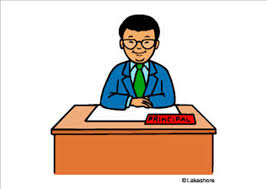principal
英 [ˈprɪn.sə.pəl]
美 [ˈprɪn.sə.pəl]
- adj. 主要的;资本的
- n. 首长;校长;资本;当事人
使用频率:

记忆方法
1、prin- + cip- + -al.
2、字面含义:that takes first. => first in importance, principal, chief, "main, most important," of persons.
2、字面含义:that takes first. => first in importance, principal, chief, "main, most important," of persons.
中文词源
principal 主要的,最重要的,校长,院长,王公,小国君主
来自古法语principal,主要的,最重要的,来自拉丁语principalis,最重要的,来自princeps,国王,统治者,酋长,词源同prince.引申词义名词词义校长,院长等。
英语词源
- principal (adj.)
- c. 1300, "main, principal, chief, dominant, most important;" also "great, large," from Old French principal "main, most important," of persons, "princely, high-ranking" (11c.), from Latin principalis "first in importance; original, primitive," from princeps "first man, chief, leader" (see prince).
- principal (n.)
- c. 1300, "ruler, governor;" also "main part;" from principal (adj.) or from or influenced by noun uses in Old French and Latin. From mid-14c. in the sense of "money on which interest is paid;" 1827 as "person in charge of a public school," though meaning "head of a college or hall" was in English from mid-15c.
权威例句
- 1. The two principal combustion products are water vapor and carbon dioxide.
- 两种主要的燃烧产物是水蒸气和二氧化碳。
- 2. City's principal marksman was Joe Harvey who scored seventeen goals.
- 市队的头号射手是打进17粒进球的乔·哈维。
- 3. The students passed a motion of no-confidence in the college principal.
- 学生们通过了对校长进行不信任投票的动议。
- 4. Donald King is the principal of Dartmouth High School.
- 唐纳德·金是达特茅斯中学的校长。
- 5. Stoppard had to recast four of the principal roles.
- 斯托帕德只好更换4个主要角色的人选。
